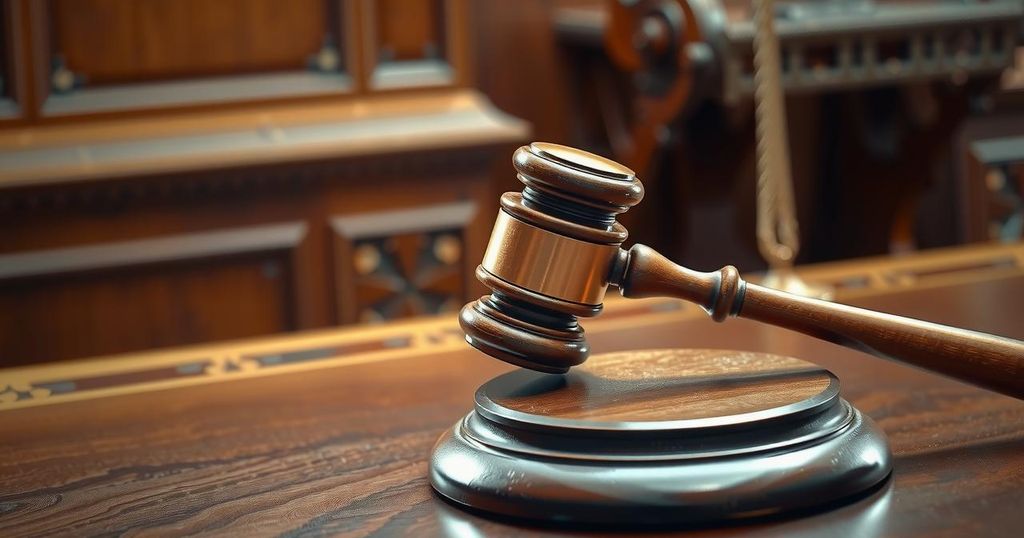Politics
- 13, ASIA, BOASBERG, BUKELE, CIRCUIT COURT OF APPEALS, COURT CASE, CUBA, D. C. CIRCUIT COURT OF APPEALS, DI, EL SALVADOR, JUDICIARY, JUSTICE DEPARTMENT, LAW, LEGAL SYSTEM, NAY, NORTH AMERICA, PHILIPPINES, SOUTH AMERICA, SUPREME COURT, SUPREME COURT RULING, TREN DE, TREN DE ARAGUA, TREN DE ARARAG, TREN DE ARARAGUA, TRUMP, U. S, UNITED STATES, VENEZUELA, WASHINGTON
Sophia Klein
Federal Judge Upholds Block on Trump’s Venezuelan Deportation Flights
A federal judge confirmed a block on Trump’s deportation flights targeting Venezuelans associated with the Tren de Araragua gang, insisting individuals should challenge their alleged gang memberships prior to deportation. This decision arises from a broader conflict between the Trump administration and judicial authorities regarding immigration policies and individual rights. Ongoing appeals and the treatment of deported individuals are pertinent concerns.
In a recent ruling, Chief U.S. District Judge James Boasberg denied a motion by the Trump administration to lift a block on deportation flights aimed at alleged members of the Venezuelan crime gang, Tren de Araragua, citing the Alien Enemies Act. The ruling stipulates that any Venezuelan individuals targeted for deportation must have an opportunity to contest membership in the gang before their deportation proceeds.
The Trump administration previously appealed Boasberg’s temporary block, with a subsequent hearing scheduled at the D.C. Circuit Court of Appeals. Judge Boasberg’s decision reflects ongoing tensions not only within the Trump administration but also with the judiciary, which has at times halted presidential orders. In a notable response to Trump’s calls for impeachment against judges, including Boasberg, Supreme Court Chief Justice John Roberts emphasized that the proper recourse for unfavorable decisions is through the appeal process.
The Justice Department maintains that President Trump is entitled to invoke the Alien Enemies Act from 1798 to expedite deportations involving gang members who are purported to have infiltrated the U.S. Under this initiative, Trump has labeled the deportees as the “worst of the worst.” However, Venezuela’s Interior Minister Diosdado Cabello has denied that any deportees sent to El Salvador are linked to Tren de Araragua.
Advocates argue that immigration authorities are misidentifying individuals based on tattoos, family connections, and professions, as seen in the case of a professional soccer player who fled Venezuela due to political persecution. Federal lawyers argued that certain Venezuelans could be deported without hearings, although they face significant opposition from affected families and advocates.
On March 15, two flights deported 238 alleged members of Tren de Araragua and 23 individuals linked to MS-13 to El Salvador, according to notification by President Nayib Bukele; however, these figures have yet to be validated by U.S. officials. Those that were deported risk their safety in a harsh Salvadoran prison environment known for severe conditions, which reportedly prohibits visitation, recreation, and educational opportunities.
Following the temporary block placed on flights on March 15, Judge Boasberg had issued a verbal order for the government to redirect flights midair, a move the government contested, arguing the judge lacked this authority. The dispute remains contentious and unresolved. The five Venezuelan plaintiffs who initiated the lawsuit currently maintain their stance against gang membership and have not yet faced deportation. Judge Boasberg proclaimed that those disputing their gang affiliations are protected from deportation until a judicial resolution is reached regarding their claims.
The decision by Chief Judge Boasberg underscores the importance of judicial oversight in deportation cases under the Alien Enemies Act. The ruling highlights the necessity for individuals to have the opportunity to contest deportations before being subject to removal. The ongoing legal battle encapsulates the complex interplay between national security concerns and individual rights, particularly in cases involving alleged gang affiliations. As the situation unfolds, the implications of this ruling will likely resonate throughout judicial and immigration systems.
Original Source: www.usatoday.com








Post Comment